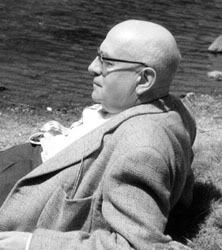He becomes his admirers, or, I heart Theodor Adorno
From Theodor Adorno's Negative Dialectics:
"In dialectics, however, it is not total identification that has the last word, because dialectics lets us recognize the difference that has been spirited away. Dialectics can break the spell of identification without dogmatically, from without, contrasting it with an allegedly realistic thesis. The circle of identification--which in the end always identifies itself alone--was drawn by a thinking that tolerates nothing outside it; its imprisonment is its own handiwork. Such totalitarian & therefore particular rationality was historically dictated by the threat of nature. In fear, bondage to nature is perpetuated by a thinking that identifies, that equalizes everything unequal. Thoughtless rationality is blinded to the point of madness by the sight of whatsoever will elude its rule. For the present, reason is pathetic; nothing but to cure ourselves of it would be rational. Even the theory of alienation, the ferment of dialectics, confuses the need to approach the heteronomous & thus irrational world--to be 'at home everyewhere,' as Novalis put it--with the archaic barbarism that the longing subject cannot love what is alien & different, with the craving for incorporation & persecution. If the alien were no longer ostracized, there hardly would be any more alienation" (172).
"In dialectics, however, it is not total identification that has the last word, because dialectics lets us recognize the difference that has been spirited away. Dialectics can break the spell of identification without dogmatically, from without, contrasting it with an allegedly realistic thesis. The circle of identification--which in the end always identifies itself alone--was drawn by a thinking that tolerates nothing outside it; its imprisonment is its own handiwork. Such totalitarian & therefore particular rationality was historically dictated by the threat of nature. In fear, bondage to nature is perpetuated by a thinking that identifies, that equalizes everything unequal. Thoughtless rationality is blinded to the point of madness by the sight of whatsoever will elude its rule. For the present, reason is pathetic; nothing but to cure ourselves of it would be rational. Even the theory of alienation, the ferment of dialectics, confuses the need to approach the heteronomous & thus irrational world--to be 'at home everyewhere,' as Novalis put it--with the archaic barbarism that the longing subject cannot love what is alien & different, with the craving for incorporation & persecution. If the alien were no longer ostracized, there hardly would be any more alienation" (172).


No comments:
Post a Comment